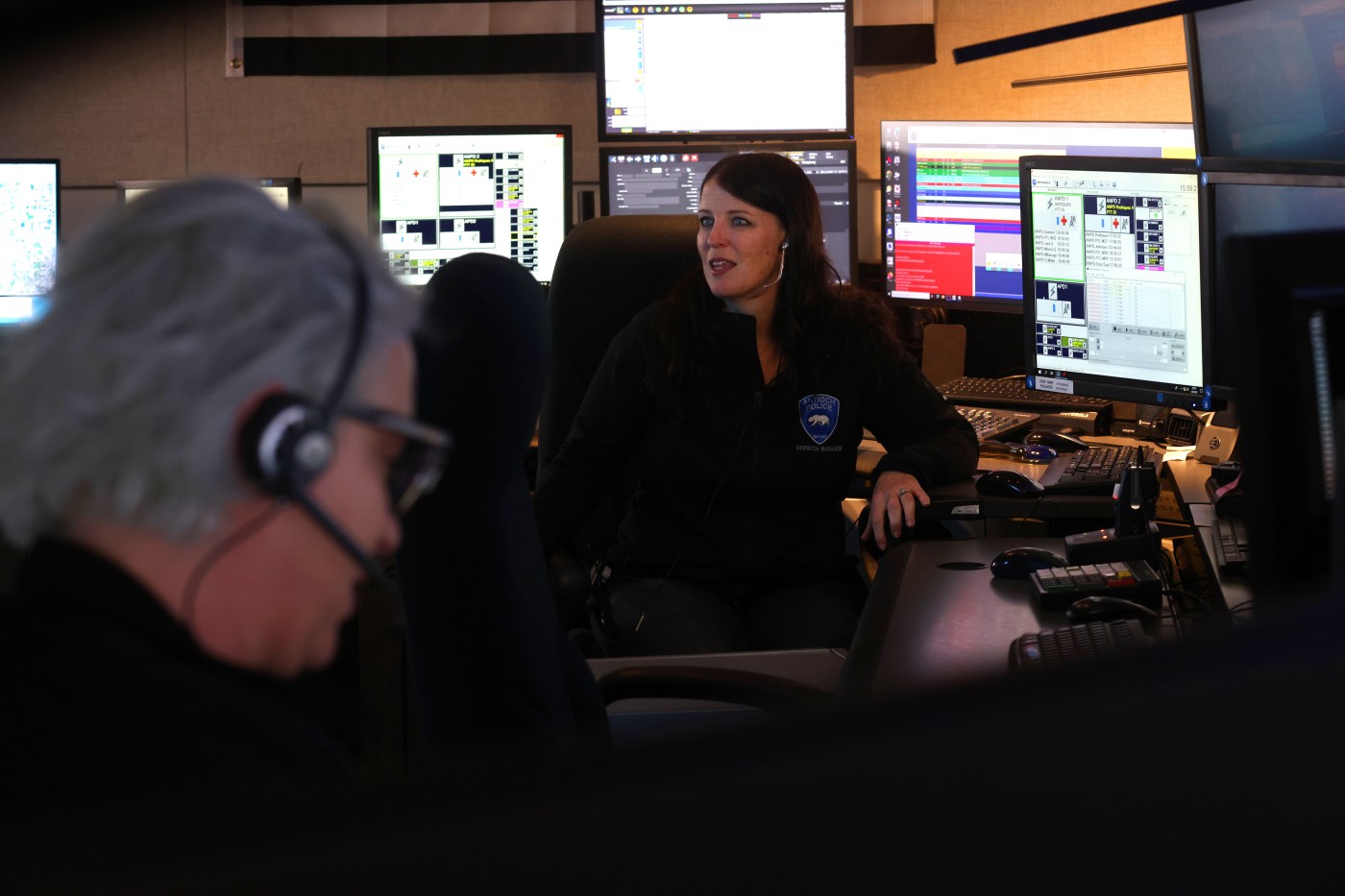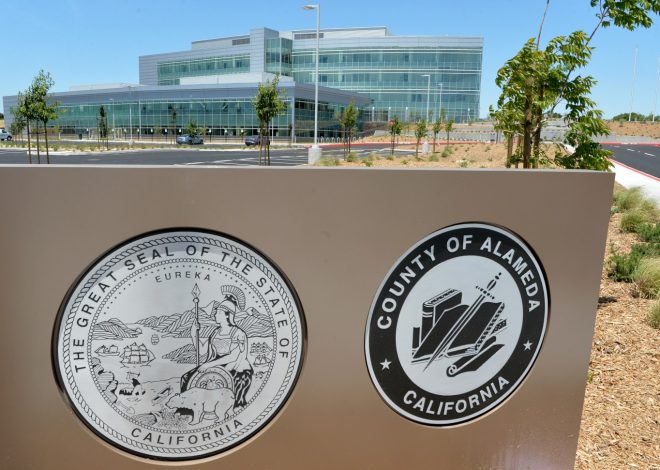
Antioch 911 dispatchers balance chaos, compassion, and crises
ANTIOCH — Not all heroes wear capes – some wear a headset, sit behind a desk facing at least five computer screens, and answer a barrage of emergency calls when someone dials 911.
Related Articles
Two victims hospitalized following Oakland shooting
Two killed, one wounded in North Oakland shooting
‘Numerous’ attempts to serve subpoena to ex-Alameda County DA Pamela Price have failed, public defender says
Sex tape, secrets, and snitches: In failed attempt to dismiss police brutality case, ex-Antioch cop airs department’s dirty laundry
Oakland boy, 15, charged with killing man over son’s stolen scooter
Similar to other communities across the country, these unsung heroes in Antioch are a team of dispatchers who handle bustling emergency calls. They navigate daily crises, all the while using empathy and efficiency during someone’s darkest hours.
Stacey Malsom, a dispatch manager with the Antioch Police Department, said her team handles about 13,000 calls each month.
There are six lines dedicated exclusively for 911 calls and there are two other lines reserved for 10-digit emergency calls at 925-778-3911. The team also responds to 911-emergency text services.
Dispatcher Vince Norris with the Antioch Police Department works in the communications center on Thursday, Jan. 9, 2025, in Antioch, Calif. (Aric Crabb/Bay Area News Group)
Dispatcher Vince Norris with the Antioch Police Department works in the communications center on Thursday, Jan. 9, 2025, in Antioch, Calif. (Aric Crabb/Bay Area News Group)
Dispatch Manager Stacey Malsom, right, with the Antioch Police Department works in the communications center on Thursday, Jan. 9, 2025, in Antioch, Calif. (Aric Crabb/Bay Area News Group)
Dispatch Manager Stacey Malsom with the Antioch Police Department works in the communications center on Thursday, Jan. 9, 2025, in Antioch, Calif. (Aric Crabb/Bay Area News Group)
Dispatcher Vince Norris with the Antioch Police Department works in the communications center on Thursday, Jan. 9, 2025, in Antioch, Calif. (Aric Crabb/Bay Area News Group)
Dispatcher Vince Norris with the Antioch Police Department works in the communications center on Thursday, Jan. 9, 2025, in Antioch, Calif. (Aric Crabb/Bay Area News Group)
Dispatcher Vince Norris with the Antioch Police Department works in the communications center on Thursday, Jan. 9, 2025, in Antioch, Calif. (Aric Crabb/Bay Area News Group)
“We also have the care team, and it’s a crisis response team, so we take all their calls, and we have a radio channel for them as well,” said Malsom.
Malsom said no day is typical, but most mornings have a slow start.
“People wake up and notice things – a broken-into car or something they missed overnight,” said Malsom, who has been with the department for 20 years.
As the day progresses, however, calls typically come in at a more rapid pace.
Dispatchers handle everything from non-emergency calls about stolen license plates, to noisy neighbors, to life-or-death 911 calls. Sometimes, one big emergency can cause a delay, as calls reporting on the same incident are received.
“But it is also good because you need to talk to a lot of people to find out what’s happening,” said Malsom. “So, it’s not a bad thing. It just makes us busier.”
Malsom and her team take these calls from the L.K. Herendeen communications center within the Antioch Police Department. They work around the clock in the dark room, content with the glow from monitors and light from an entrance walkway.
“It just cuts out the headache,” said one dispatcher of the limited light environment.
Malsom said answering emergency calls set the tone for her career, adding it is hard to know what’s waiting on the other end of the call.
The dispatch team has been operating with 12 of its 17 allotted members. A staffing shortage has forced many to work 16-hour shifts, sacrificing family time and holidays. However, the team is expected to welcome two more members soon.
Despite the pressures, Malsom said supportive team members and a good working relationship with other officers keeps morale intact.
“We look out for each other,” Malsom said. “If someone has a family event, we’ll cover their shift.”
She said occasionally, trained officers step in to help her team out during busy times.
“If we only have two people (at the center), and someone needs to go to the bathroom (or for lunch), we’ll call in an officer because we have two radio channels, and one person is not going to be able to handle that,” said Malsom. “So we will have an officer come in for an hour or so (to help).”
Malsom said her team takes ample breaks and receives mental health support. Sometimes, the team comes in to debrief and talk with dispatchers who were on a major incident call.
“We’ve had a couple of incidents (when police) officers are involved. It affects you too because it’s somebody you work with all the time,” said Malsom. “Then the (mental health) team comes and hangs out with us after (such) events.”
She said the Antioch Police Department has also been supportive in providing resources, such as comfortable chairs and desks, as well as equipping them with RapidDeploy, a platform that helps dispatchers locate emergencies.
Despite all that, the stress of the job can take a toll. Not all calls are what they seem. Malsom recalled the early days of her training when she answered a call on the non-emergency line.
“Someone called and said they found a family member had hung themself in their closet,” she said.
Malsom’s trainer, who was next to her, encouraged her to take on the call. The person on the line was calm, and Malsom was able to help them.
“Still, it (must have been) scary for them,” she said. “You want to do the best you can to help them because it’s the worst day of their life.”
For Malsom, one of the hardest calls she took was about an infant who was left in a car and died – a call she answered shortly after returning from maternity leave.
Sadly, Malsom said she has encountered many incidents related to children drowning. She once heard a fellow colleague answering a call that involved a mother screaming in Spanish about her two kids involved in such an emergency.
“After that, if I ever go to a pool party and I’m with you, I am going to tell you to watch my kids if I’m going to the bathroom,” she said. “People always think somebody else is watching their kids, and then the kids drown. It just affects how I raise my children, how I am every day.”
Fellow dispatcher Nahleen Cloninger, who has been with the department for 17 years, said there are calls that “stick” with them.
“I attended a call when I was in training, and I will never forget that mother’s guttural cry. That will never leave you,” said Cloninger. “But you have to learn what works for you, your flight or fight response, and be resilient.”
For Cloninger, taking walks and getting some sun helps her through tough days, but sometimes, some calls can be personal. She said there have been times she’s answered calls from her friends facing emergency situations.
“It gives you chills, you hold your breath for a second, and you remember what to do,” she said.
She even had to help a friend who had a home invasion robbery.
“She was home alone; someone rang the doorbell, but she ignored it, and then came three guys with guns,” said Cloninger. “She hid in the closet, and I took the call. This is someone I know!”
Cloninger had to remain calm and do her job to get help for her friend.
Despite the challenges, the team believes that each call is more than just a job – it’s a chance to make a difference.
“It’s impossible not to be affected by this job. I’m more aware of situational (dangers),” said Cloninger. “But we see good (things happening) too, just as much as we see the bad ones.”


